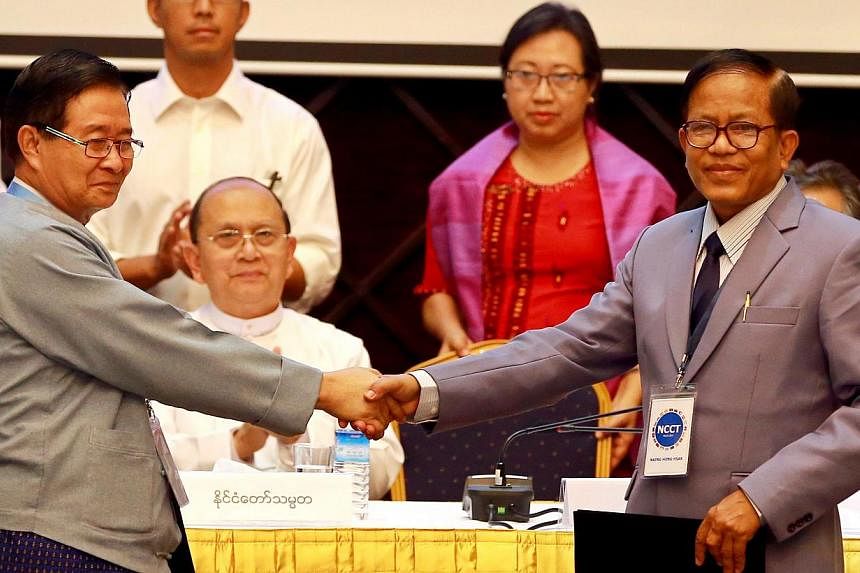Sixteen armed ethnic groups have agreed to the text of a Nationwide Ceasefire Accord (NCA) with the Myanmar government, marking a major step towards the actual signing, which is expected to take place next month.
Myanmar's President Thein Sein, who has made reaching an NCA one of his top priorities, witnessed the signing of a three-page statement at the Myanmar Peace Centre (MPC) in Yangon yesterday. He said all the parties had agreed to the text.
"I'm really happy that the two sides have finally agreed on a single draft," Mr Thein Sein said. "This opens the door for political dialogue and also further peace talks."
His presence yesterday in effect means that the government has agreed to the text of the NCA, even if it may have to be presented in Parliament as a formality. The armed groups will hold their own leaders' summit after the April 14-16 Thingyan water festival to discuss the accord.
Mr Hla Maung Shwe, a senior adviser at the MPC, told reporters: "If everything goes well, the Nationwide Ceasefire Accord will be signed by top leaders of ethnic armed groups in Naypyitaw in May."
Once signed, the agreement would potentially end some 60 years of on-again, off-again conflicts and civil wars.
Myanmar's ethnic minorities such as the Kachin, the Karen and the Shan, which are three of the most powerful, have been fighting for their autonomy and identity against the authority of the Burman-dominated state more or less since the country's independence from colonial rule in 1948.
The wars have seen many thousands killed or left maimed and tens of thousands displaced, some living in refugee camps across the border in Thailand.
The NCA will turn a patchwork of often shaky bilateral ceasefire agreements between the government and individual armed groups into a sweeping agreement with all.
But while it is a crucial step, it will also mark the beginning of a potentially more complex dialogue over political and security issues.
In an interview published last Friday, Kachin Independence Army's chief, General Sumlut Gun Maw, told The Irrawaddy journal that "matters we have to discuss after signing the NCA are much more difficult, so signing the NCA does not mean achieving peace".
But Mr Vijay Nambiar, the United Nations' secretary-general's Special Adviser on Myanmar, said yesterday's agreement was "a signal that new levels of trust, confidence and cooperation are possible between former enemies and that the seeds of change in Myanmar are beginning to sprout".
The NCA would be the "first step towards a larger dialogue for settling the political and military issues that will pave the way for an inclusive and harmonious future for Myanmar", he added.
This week's meetings were the latest of seven rounds of talks that began in 2013. The negotiations often stalled on the role of the military and the armed groups' troops who, in some cases, number in the thousands; control of natural resources; and the issue of federalism.
But meetings between the leaders of the Kachin Independence Organisation, including General Gun Maw, and Mr Thein Sein in Naypyitaw in the days preceding the latest round of talks seemed to have paved the way for an agreement.
Also, analysts said, wide public support for the Myanmar army in its war against the Kokang was a signal that the army was willing to take on armed groups.
Mr Richard Horsey, an independent analyst and former top UN official in Myanmar, told The Straits Times on the phone: "It's historic, all the signals are positive, but (the NCA) is not in the bag yet."
But it was very likely that the armed groups would sign up.
"There is a lot of political momentum, and it is going to be hard for any leader of the armed groups to disagree," he added.

